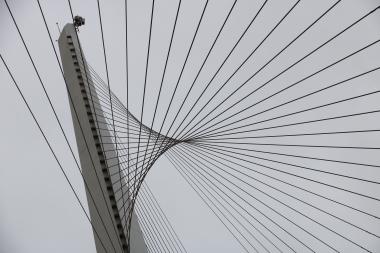TECHNICAL TEXTILES ARE A SUCCESSFUL INDUSTRY IN ISRAEL
- Israeli Manufacturers with increasing Presence on the World Market
The production of technical textiles is one of the leading sectors of the Israeli textile industry. Their success is not least due to intensive research and development. In view of the fierce international competition facing the Israeli textile industry, high-quality and innovative products are indispensable for stabilizing this
industry. One of the sectors that best manage this modernization is the production of technical textiles.
In 2017, this product category accounted for an estimated USD 600 million or nearly one-third of the total sales generated by the textile and apparel industry. With an export share of around 70 percent, the division is also strongly world market-oriented and accounted for USD 414 million, 43 percent of Israeli textile and clothing exports in 2017.
The production of technical textiles is based not least on strong domestic demand. The largest domestic customers include the armed forces and security forces, which demand high functionality and top quality from their suppliers. Among other things, this market segment produces bulletproof textiles, special textiles for uniforms, carrier bags for sensitive devices under field conditions and camouflage nets.
Strong domestic demand helps product development
As the Fashion & Textile Industries Association explained to Germany Trade & Invest in January 2019, direct contact with the military and internal security institutions helps companies to offer tried and tested products. In addition, according to Maya Herscovitz, director of the association, former members of the armed forces and security forces who are familiar with the requirements for corresponding products are active in the manufacturing companies.
Other domestic customer industries are construction and agriculture. Building construction is increasingly relying on modern building materials, including lightweight and highly insulating textiles. The agricultural sector, on the other hand, contributes only 1.2 percent to the gross domestic product, but is capital-intensive and innovation-oriented. Safety nets are a popular agrotechnical product. In September 2018, Israeli agronomist Yossi Ofir pointed out in a contribution that climate change is leading to an increasing use of shadow nets. Last but not least, more and more Israeli farmers covered entire orchards with shade nets.
Networking with the high-tech industry
The anchoring in the domestic market and the direct contact to customers accelerate the development of new products. At the same time, the technical textiles sector is embedded in the high-tech scene. For example, manufacturers integrate research results from nanotechnology and materials science into their products.
An example of this is Marom Dolphin, which manufactures military and civilian products and uses plastics, metal and composite materials to increase the strength of its textile products or reduce their weight. A leading manufacturer of technical textiles is Hagor Industries, which offers combat vests, protective vests, backpacks and tents of all sizes among other things, while Source - Shoresh produces textile hiking accessories. These and similar manufacturers are represented on numerous export markets.
Some companies do not offer finished products, but technological solutions. Nano Textile, for example, has launched an antibacterial sonochemical coating for textiles. Hospitals are planned as a main field of application, but according to company information other fields of application such as aircraft construction and public transport, restaurants and hotels or baby clothing may also open up. Gideon Guthrie Technical Textile also offers research and development (R&D) services in cooperation with Israeli and foreign textile manufacturers.
In addition to the activities of the company's own R&D departments, research is also carried out at universities. For example, the textile coating technology used by Nano Textile was developed at the Israeli Bar Ilan University. The Shenkar College of Engineering, Design and Art is home to CIRTex (The David & Barbara Blumenthal Israel Center for Innovation and Research in Textiles). The center carries out applied research on new products, production processes and applications for textiles and promotes cooperation between established companies on the one hand and start-ups and individual inventors on the other. Industrial textile research and development is supported by the Innovation Authority.
According to the trade association, the production of technical textiles will continue to increase in the coming years. As Maya Herscovitz explained to Germany Trade and Invest, manufacturers of technical textiles invest large amounts not only in the development of new products, but also in the modernization and automation of production processes. This was not only necessary for reasons of cost savings, but also because of the shortage of skilled workers on the labour market.
Israel is a net exporter of technical textiles
Der mit großem Abstand wichtigste Exportposten im Bereich technischer Textilien (SITC 657) sind The by far most important export item in the technical textiles sector (SITC 657) are nonwovens (SITC 657.2). They accounted for 67.1 percent of total exports of technical textiles in 2017, or USD 278 million. Second place went to batting, wicks and goods and products for technical use made of textile materials. With an export value of USD 88 million, they accounted for 21.6 percent of industry exports.
The most important export market in 2017 was the USA, followed by the Netherlands and Germany in a great distance. The Federal Republic of Germany purchased technical textiles worth USD 44.7 million (10.8 percent of Israeli exports) from Israel.
With USD 136 million imports accounted for 32.6 percent of exports. The three most important supplier countries - China, Turkey and Italy - were almost on a par at USD 25 million, USD 24.8 million and USD 24.2 million. Germany ranked fifth and, with a delivery value of USD 11.2 million, achieved an import market share of 8.3 percent.
Wladimir Struminski, Germany Trade & Invest www.gtai.de





